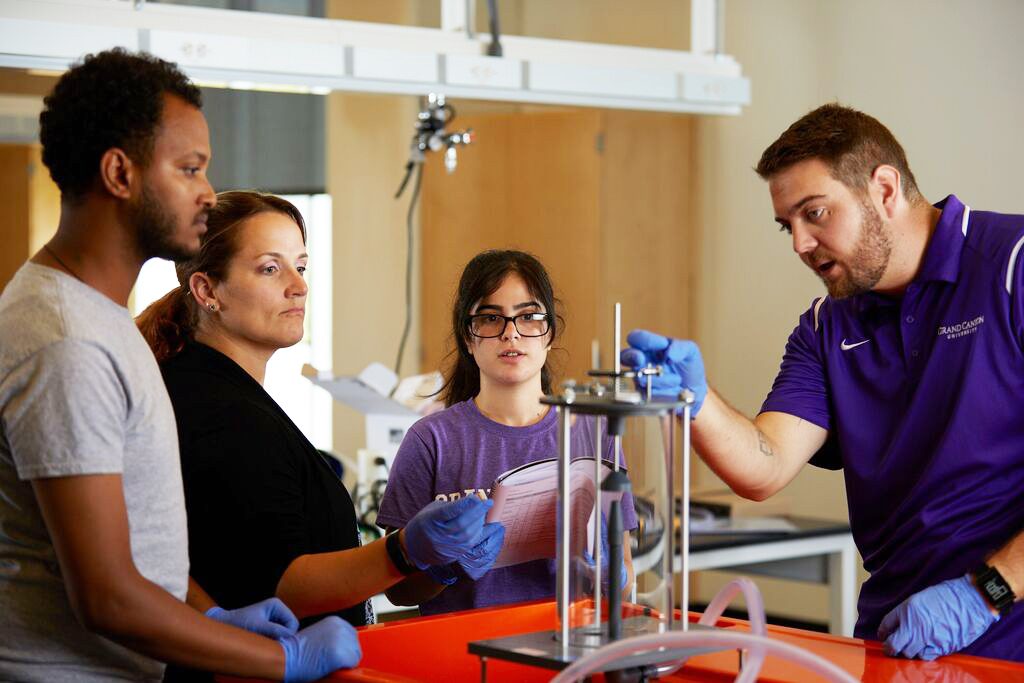
By Lana Sweeten-Shults
GCU News Bureau
Christian Clifton popped into this job and that, as a firearms instructor, a high school math teacher and as a political campaign worker, all the while tinkering with engineering and tech projects in his spare time.
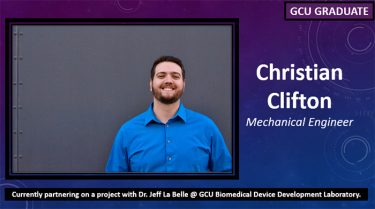
That’s when his wife stepped in and told him: “Hey, you should just get paid to do all this stuff instead of just spending all our money on projects,” Clifton said with a laugh as he spoke to Grand Canyon University students recently as part of a virtual panel of engineers from Benchmark, where Clifton works as a mechanical engineer.
It was just a year ago that Clifton sat where some of the students he spoke to find themselves on most days, in a classroom listening to a lecture or in a lab building something in GCU’s College of Science, Engineering and Technology.
The 2019 Bachelor of Science in Mechanical Engineering graduate – he was among the University’s first engineering grads -- spent much of his time managing the Lopes Lab Makerspace as a student worker, showing his classmates how to use lab equipment or aiding them with design.
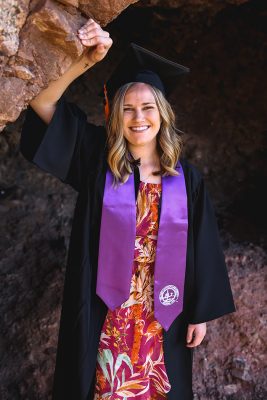
Now he, along with spring 2020 GCU mechanical engineering graduate Kylie Shaplin, find themselves taking on a new role. Instead of being the students listening to panelists speak about their jobs, they were the panelists speaking to GCU’s students during the event, organized by the campus’ Strategic Employer Initiatives & Internships team (SEI), in collaboration with the Engineering Department.
Showcasing graduates in their post GCU careers is something SEI, Academic and Career Excellence, and the University’s colleges strive to highlight as much as possible, said Aysha Bell, SEI Director of Employer Relations & Recruitment Services.
Plus, “Students are inspired by their fellow Lopes,” said Bell.
"Christian and Kylie are great examples of graduates from GCU Engineering; they hit the ground running and transitioned their leadership skills, hands-on experience and academic knowledge to the workplace," said Dr. Janet Brelin-Fornari, Associate Dean of Engineering.

Clifton shared with the students how he got to his position at Benchmark, a Tempe-based technology company that designs and builds products for 200 businesses around the world. “Being on the other side is an incredible opportunity mainly because it was not that long ago that I was one of the students doing everything I could to get information on the industry,” he said.
He graduated in 2012 with his first undergraduate degree, in youth ministry, before trying different career paths. He conveyed to students that the road they take might not always be a straight one. It might take a few turns to get to their destination.
Shaplin also didn’t start out on the engineering path at Benchmark, though that's where she envisioned she would go. She was a digital marketing intern at the company while she was studying engineering at GCU, where she helped found the Society of Women Engineers chapter and served as chapter president. She transitioned from digital marketing to becoming a mechanical engineering intern for Benchmark's Lark RF Technology site. That second internship led to an offer to become a full-time mechanical engineer.
She stressed the importance of making room in your schedule for an internship. It’s critical to learn in the classroom, she said, “but with that (in mind), taking it a step further and applying that knowledge with an internship.”
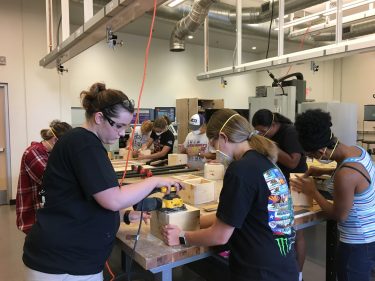
Shaplin shared what she loves about her job: “You’re working on something new, basically, every hour here. It’s super fun. It keeps you on your toes.”
She has gone from her internships to working in quality assurance to what she does now, which includes simulations for internal research projects.
Clifton, too, loves how he’s not fenced into just one project for months at a time. He experiences “the entire swath of engineering” at Benchmark, he said.
“I’m never bored. I’m currently working on about four to five different projects, depending on the day. I get to do a lot of cool stuff – working on products for in the home, from things that people think are simple, like air fresheners that you actually have to spend a lot of time on to design all the different components, to fall detection for elderly care, to working in the semiconductor manufacturing world and looking at designing some of the equipment that actually makes those 7-nanometer small transistors.
“It just blows my mind to think I’m working on a machine that does that.”
His advice to students: Build as much as you can in GCU’s labs. While designing something theoretical in SolidWorks is good, nothing beats "actually building things.”
“You’ve got to get in and get hands-on with stuff. That’s where the fun of engineering really is,” Clifton said. “It’s actually getting to put stuff together and break stuff sometimes and figure out why it broke and fix it and put it together a dozen times to make sure it works properly.”
Benchmark engineering manager Jason Vaughn, one of the panelists, said he sees a big gap between graduates who learn theory and those who have practical hands-on experience. He looks for students who can read blueprints or have taken welding classes.
“The two interns I brought on from GCU, literally the first or second day I was able to throw them projects – high level, full-blown engineering projects, and they’ve been willing to pick it up, get right in, roll up their sleeves, get their hands dirty and get to work building components,” Vaughn said. “I think that’s critical.”
Clifton added that students shouldn’t limit themselves to, say, only mechanical engineering projects. Join in an electrical engineering or software project, he said. The skills a student develops will make them valuable to potential employers.
“I can go read an electrical components spec sheet, which makes my job 1,000 times easier,” said Clifton, who also advised students to not just send out the same resume to every employer. Cater your resume to fit the job you're applying for.
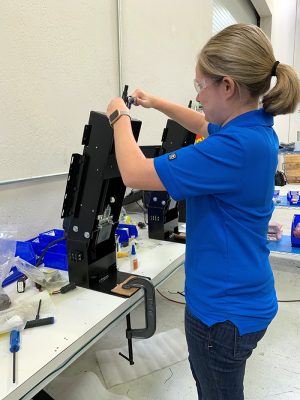
In giving his advice to students, Clifton joked how he experienced a bit of “impostor syndrome” being a GCU panelist, since he’s not far removed from being a student himself. But, he added, “Having the chance to share my experiences and the knowledge I’ve gained along the way is a privilege.”
Clifton said he often will ask questions of co-worker Justin Hall, an electrical engineer who is partnering with Clifton and GCU’s Dr. Jeff LaBelle on a project in the Biomedical Device Development Laboratory.
Shaplin said serving her fellow students as a panelist and recent grad was an amazing experience. “I wanted to be able to show the students that if you work hard at something and set your mind to it, you can succeed.”
Clifton echoed her thoughts: “I want as many people to succeed as possible, especially from my own alma mater, GCU. I have no idea what the future may hold. I could end up working alongside any of the students I talked to. As such, I want them to be prepared, confident and ready to do their best should that happen.”
GCU senior writer Lana Sweeten-Shults can be reached at [email protected] or a 602-639-7901.
****
Related content:
GCU Today: GCU programs earn prestigious ABET accreditation
GCU Today: Faith and science purposefully coexist at GCU
GCU Today: Onward, upward – GCU helps students step into jobs









































































